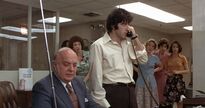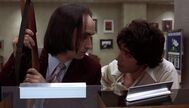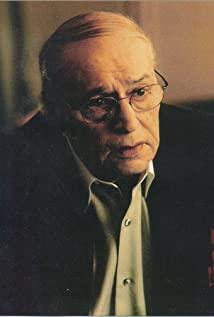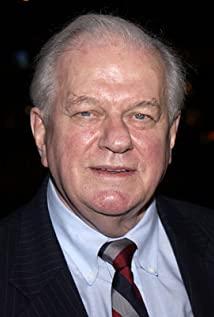The background of the film is set after the Attica prison incident in 1971. In this prison riot, the American police shot and killed more than 40 innocent American citizens in order to suppress the riot. In the reflection on freedom, democracy and human rights, there is a strong suspicion and unease about the American core values and beliefs.
The beginning of the film shows the anxiety and agitation of the crowd in Brooklyn, New York under the hot summer. Sonny, played by Al Pacino, walks into a bank with his companions one after another. This seemingly well-planned robbery turns out to be in full swing. The shrewd and panic-stricken Sonny knows how to keep the bank staff away from the alarms, cover all the monitors with spray, and press a piece of waste paper before taking out the last banknote in the cash register to prevent the alarm from going off automatically; but he Unexpectedly, a timid companion fled, and the entire bank vault actually only had more than 2,000 US dollars in cash. The panicked hostages would suffer from asthma, diabetes symptoms, urgency, etc., and they thought they were smart enough to burn the registration book. The black smoke attracted the police to surround them in the bank. Since then, the smoke of black farce has spread to the whole film.
But the greatness of the film lies not only in the absurd robbery, but also in showing the whole sick American society and the helplessness and confusion of the characters in this era in an absurd form.
Relying on the bank's phone calls, Sonny (a citizen at the bottom) started contact with the police (the U.S. government), and started the first head-to-head negotiation with the police by taking an asthmatic hostage out for medical treatment. In front of the bank gate, the two sides accused each other of being hypocritical and untruthful. In the context of an angry negotiation, Sonny roared to the crowd: "Don't forget Attica", reminding people who is using the fake American style. Democracy deceives everyone's beliefs. This deafening shout caused all the onlookers, even the hostages in the bank, to defect. The justice created by the police blurs the line at this moment. The excited crowd regards Sonny as a civilian hero and cheers for him; the hostages also give up the opportunity to escape, they are afraid that the police will sacrifice for the so-called justice. They paid for it, and the promise of the robber Sonny seemed more worthy of their trust. In order to maintain the only remaining American-style fig leaf of democracy, under the coercion of public opinion, the police started premeditated negotiations with a hypocritical and weak posture.
The phone is the most important negotiation (communication) tool in the whole play. Every face-to-face conversation is a process of angry confrontation, fanning the flames, and insidious calculations. It shows that in the current society, the contradiction between the people and the government is an accidental incident. The fermentation of the situation becomes the enemy and the enemy, and it is even impossible to communicate calmly. And only by being alone on the other end of the phone can the director use Sonny's mouth to tell the individual's aspirations and the morbidity of the society.
1 The labor system that puts the cart before the horse: the proud labor union system of the American workers was originally an important platform for the working class to safeguard individual rights and interests, but in the economically exhausted American society in the 1970s, the labor union became an accomplice to deprive the bottom people of reasonable remuneration. Sonny told the media on the phone that only by joining a union can they get a salary that is enough to survive, and laborers outside the union can only get more than $100 a week. It is far from enough for him, let alone the pursuit of his own ideals in life, which directly led him to the idea of robbing a bank.
2 Unfair discourse platform: The media in the film has become a curious and utilitarian communication platform. They only focus on the hot spots where the contradictions are most concentrated, and turn a deaf ear to the deep voices beneath the contradictions. When Sonny talked about the denial of work rights in an interview on the other end of the phone, the station cut the interview, citing a blackout. On the one hand, it is an excessive waste of the right to speak, but on the other hand, the people are extremely eager to speak on a broad discourse platform. The hostages in the film will forget the panic of their lives by appearing on TV, and use it as a talk to jump with the other hostages; a deliveryman delivering pizza to Sonny and the hostages, roaring wildly for being alone in the media camera You are a hero yourself. Hidden under the absurd individual behavior is the disregard of the individual life by the whole society and the sadness that the human body desperately wants to show the life form.
3. High-sounding political lies: The political lies of the whole film are mainly reflected in the false American democracy manifested in the "Katia" riots and the individual heroism promoted in the Vietnam War. The former need not be repeated, and the latter is also based on Sonny. Sonny and another robber were both soldiers who participated in the Vietnam War. They listened to the US military's declaration of joining the army, and delusionally wanted to achieve their heroic dreams in the war. What's under is a pile of bones. After returning to China, the government kept silent about the defeat, and no one cared about their physical and mental conditions after their heroes were broken. The confusion, anxiety, and the sense of gap before and after the war made them out of tune with society and became a social heresy.
4 Margins are ridiculed for ostracizing immigrants The country of dreams does not have the tolerance and atmosphere to match in this era. The "Katia" incident was directly triggered by the unfair treatment of black prisoners by white prison guards. Likewise, the rights demands of gay groups were the sharpest contradictions of that era. With the rapid awakening of individual consciousness, people have more pursuit and exploration of nature and love, but the exclusion and suppression of mainstream people have caused the distress and anger of this marginal group. Sonny's boyfriend was greeted with contemptuous ridicule when he said in front of the police, "I'm just a woman's soul mistakenly put into a man's body".
5 The selfishness of human nature and the nothingness of the soul: After the director wisely attacked the whole sick society, he criticized the fragility of the individual in this era without mercy. Because he understands that the progress of society depends on the joint promotion of the system and the individual. In the whole film, except for Sonny and another robber who have their own ideals in life and act for them, other characters have almost no ideal excitement. All the crowds and the hostages are so manipulative, when Sonny blows the lies of American democracy, they side with Sonny one-sidedly, even forming a circle to escort him into the car, and once they are released back into the crowd, In the blink of an eye, it can be integrated into the previous life trajectory, and be safe in the inherent social model. Compared to this, the selfishness of human nature is even more terrible, and they almost destroy all of Sonny's beliefs. Sonny's wife is a person who takes care of herself Ni finally had a chance to say: "If you love me so much, how can you hide at home instead of coming to the scene?" She lost her voice, and then repeated the hardships of life like a repeater. Sonny's parents only thought Sonny was a money-sucking machine. She persuaded Sonny to surrender, so that after he returned to society, he would have more children and ask the government for more social welfare payments. Sonny's same-sex lover had been avoiding him, and the only phone call was to ask Sonny to prove in front of the police that they were not accomplices.
Of course, all appeals ended in failure. A robber was killed and Sonny was sentenced to 25 years in prison. The tragedy of this era is especially ironic when it is interpreted in black farce.
View more about Dog Day Afternoon reviews











